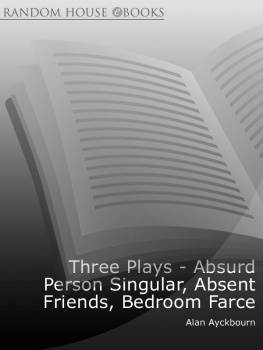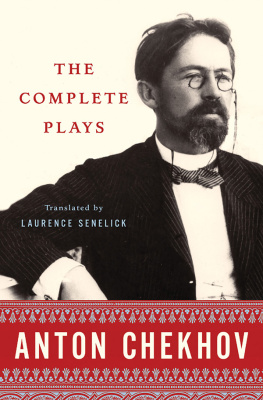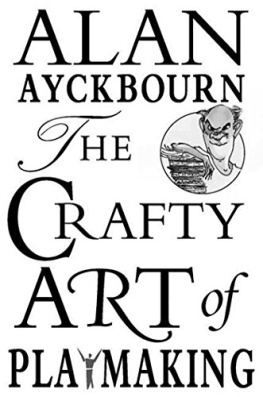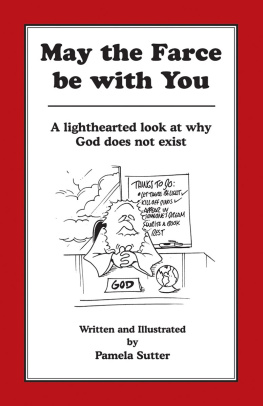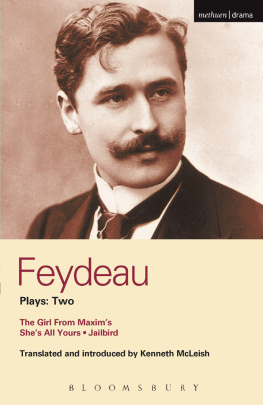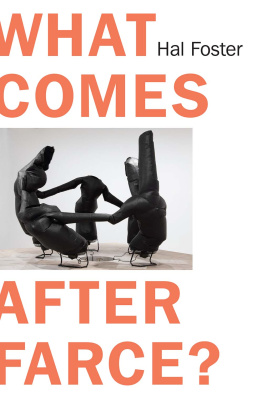Ayckbourn - Three Plays
Here you can read online Ayckbourn - Three Plays full text of the book (entire story) in english for free. Download pdf and epub, get meaning, cover and reviews about this ebook. City: London, year: 2011, publisher: Random House;Vintage Digital, genre: Detective and thriller. Description of the work, (preface) as well as reviews are available. Best literature library LitArk.com created for fans of good reading and offers a wide selection of genres:
Romance novel
Science fiction
Adventure
Detective
Science
History
Home and family
Prose
Art
Politics
Computer
Non-fiction
Religion
Business
Children
Humor
Choose a favorite category and find really read worthwhile books. Enjoy immersion in the world of imagination, feel the emotions of the characters or learn something new for yourself, make an fascinating discovery.
- Book:Three Plays
- Author:
- Publisher:Random House;Vintage Digital
- Genre:
- Year:2011
- City:London
- Rating:3 / 5
- Favourites:Add to favourites
- Your mark:
- 60
- 1
- 2
- 3
- 4
- 5
Three Plays: summary, description and annotation
We offer to read an annotation, description, summary or preface (depends on what the author of the book "Three Plays" wrote himself). If you haven't found the necessary information about the book — write in the comments, we will try to find it.
Three Plays — read online for free the complete book (whole text) full work
Below is the text of the book, divided by pages. System saving the place of the last page read, allows you to conveniently read the book "Three Plays" online for free, without having to search again every time where you left off. Put a bookmark, and you can go to the page where you finished reading at any time.
Font size:
Interval:
Bookmark:
Ten years later he was knighted by Queen Elizabeth II for services to the theatre. ALAN AYCKBOURN Three Plays:
Absurd Person
Singular,
Absent Friends,
Bedroom Farce

Offstage action is more difficult. Unless care is taken, if the dramatist chooses to describe rather than show his action, the audience can rapidly come to the conclusion that theyre sitting in the wrong auditorium. Thus, when I came to write Absurd Person and started by setting the action in Jane and Sidney Hopcrofts sitting room, I was halfway through the act before I realised that I was viewing the evening from totally the wrong perspective. Dick and Lottie were indeed monstrously overwhelming, hearty and ultimately very boring, and far better heard occasionally but not seen. By a simple switch of setting to the kitchen, the problem was all but solved, adding incidentally far greater comic possibilities than the sitting room ever held. For in this particular case, the obvious offstage action was far more relevant than its onstage counterpart.
As a footnote: since I was writing about parties and guests arriving, it also relieved me of the tedium of all that hallo-how-are-you-goodbye-nice-to-see-you business. Absurd Person, then, could be described as my first offstage action play. It is also, some critics have observed, a rather weighty comedy. Its last scene darkens considerably. I make no apologies for this. As Ive grown in confidence as a dramatist (confidence, that is, that I can get most of the techniques right most of the time), I have also grown in the conviction that I owe it to the characters Ive created to develop and therefore to a certain extent to dictate how a play should run.
Ive always had an aversion to comedies that rely upon natty, superimposed denouements in order to round off the evening. Why comedies should have to do this whereas dramas are allowed to finish as they like is beyond me. As a nation, we show a marked preference for comedy when it comes to playgoing, as any theatre manager will tell you. At the same time, over a large area of the stalls one can detect a faint sense of guilt that there is something called enjoyment going on. Should we, people seem to be asking, be sitting here laughing like this? Its to do with the mistaken belief that because its funny, it cant be serious which of course isnt true at all. Heavy, no; serious, yes.
It would therefore seem unwise to compound this guilt feeling by artificially resolving the play. In other words, it can be funny, but lets make it truthful. Absent Friends, first produced in Scarborough in 1974, followed The Norman Conquests, which to all intents and purposes was the end of my exploration of offstage action. Three plays, two of which were happening offstage simultaneously with the one onstage, were quite enough. Absent Friends was almost a drawing-in of forces. It was significant for me in several ways.
Its use of time, for one. The stage action matches real time almost second for second. Most plays have their own time span where hours or months can pass quite happily in the space of minutes. Absent Friends time span, being what it is, had the intended consequence of making the play far more claustrophobic, almost oppressive. Its single set, its small detailed action, helped. It is a play for a small intimate theatre where one can hear the actors breathing and the silences ticking away.
It was a terrifying risk when it was first produced. Id never pitched anything in quite such a low key before. Following this (with only the five short plays entitled Confusions between them) came the far more robust Bedroom Farce. This play has, I think, elements of both Absurd Person and Absent Friends in it. It has its moments of near farce and yet still contains elements of the claustrophobic maybe because its all in bedrooms. It is also the first time Ive made use, to quite such an extent, of the cross-cut device.
Jumping the action from bedroom to bedroom gives the play an added rhythm over and above what the dialogue normally provides. Again, Ive allowed the characters to progress, develop and resolve very much in their own way. Perhaps, as in my other plays, none of them finds instant happiness or sudden great self-insight. But at least they retain the dignity of resolving their own destinies. Alan Ayckbourn Scarborough 1976

This Christmas Act III Ronald and Marions Kitchen. Next Christmas
She sings happily as she works. She wears a pinafore and bedroom slippers, but, under this, a smart new party dress. She is unimaginatively made up and her hair is tightly permed. She wears rubber gloves to protect her hands. As JANE works, SIDNEY enters, a small dapper man of about the same age. He has a small trimmed moustache and a cheery, unflappable manner.
He wears his best, rather old-fashioned, sober suit. A dark tie, polished hair and shoes complete the picture
Font size:
Interval:
Bookmark:
Similar books «Three Plays»
Look at similar books to Three Plays. We have selected literature similar in name and meaning in the hope of providing readers with more options to find new, interesting, not yet read works.
Discussion, reviews of the book Three Plays and just readers' own opinions. Leave your comments, write what you think about the work, its meaning or the main characters. Specify what exactly you liked and what you didn't like, and why you think so.

